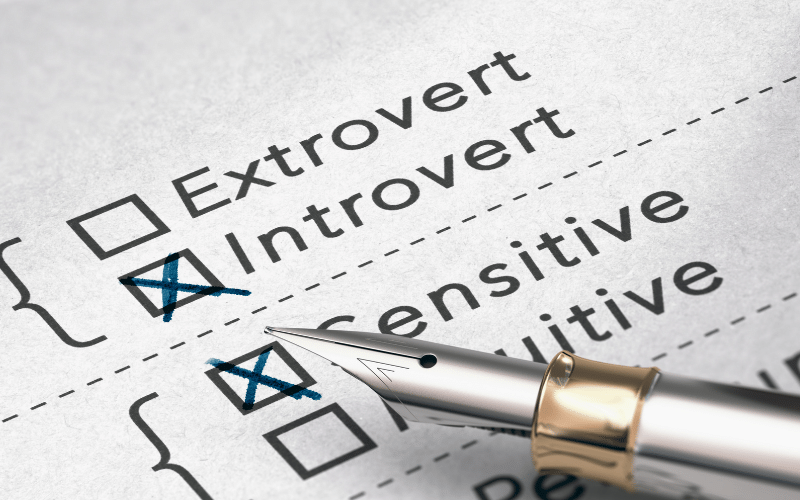Personality Traits List: 200+ Positive, Negative, and Neutral Traits
Understanding personality traits helps decode human behavior. From describing ourselves to improving relationships, grasping these traits illuminates our actions and interactions. Exploring a personality traits list can help you think about these characteristics, whether you are evaluating your own personality or coming up with ideas for your characters. What Are Personality Traits? Personality traits are…

Understanding personality traits helps decode human behavior. From describing ourselves to improving relationships, grasping these traits illuminates our actions and interactions. Exploring a personality traits list can help you think about these characteristics, whether you are evaluating your own personality or coming up with ideas for your characters.
Key Takeaways
- Personality traits are stable patterns of behavior, thought, and emotion.
- The Big Five theory organizes traits into five broad dimensions.
- Estimates of the number of traits vary widely, from a few to thousands.
- Personality traits can be classified as positive, negative, or neutral.
What Are Personality Traits?
Personality traits are often defined in a variety of ways, but in the field of psychology, they are generally thought of as characteristic forms of behaviors, thoughts, or feelings that tend to be relatively stable and consistent.
At various points in psychology history, researchers have tried to come up with a comprehensive list of personality traits. Many of these theories have focused on determining exactly how many personality traits exist.
The number of personality traits is debated among psychologists. Estimates range from a few hundred to several thousand. However, contemporary theories often group traits into five broad dimensions, known as the Big Five, which include openness, conscientiousness, extraversion, agreeableness, and neuroticism.
In this article, learn more about the number of personality traits, personality trait theories, and a list of traits that describe different aspects of personality.

Personality Traits List
So, what are some of the many traits that psychologists have identified and described at various points in history?
Some of these that are often included on a list of personality traits include:
- Absent-minded
- Accessible
- Active
- Adaptable
- Adventurous
- Agreeable
- Aggressive
- Aloof
- Altruistic
- Analytical
- Angry
- Anxious
- Approval-seeking
- Assertive
- Calm
- Callous
- Careless
- Charismatic
- Charming
- Cheerful
- Clever
- Compassionate
- Compliant
- Confident
- Conforming
- Conscientious
- Considerate
- Contemplative
- Courageous
- Creative
- Cruel
- Curious
- Cynical
- Decisive
- Dishonest
- Dramatic
- Emotionally stable
- Empathetic
- Energetic
- Enthusiastic
- Extroverted
- Friendly
- Forthright
- Gregarious
- Honest
- Impulsive
- Introverted
- Irritable
- Kind
- Loyal
- Mature
- Meticulous
- Modest
- Moody
- Narcissistic
- Neat
- Needy
- Nervous
- Neurotic
- Obedient
- Organized
- Open to experience
- Opinionated
- Optimistic
- Orderly
- Peaceful
- Perfectionistic
- Playful
- Reserved
- Resilient
- Rigid
- Risk-taking
- Self-control
- Selfish
- Sensation-seeking
- Serious
- Shy
- Sociable
- Strong-willed
- Tidy
- Timid
- Trustworthy
- Understanding
- Vindictive
- Warm
If someone asked you to describe yourself, what would you say? It can be difficult at times to think about your own personality in an objective way. You may actually find it easier to describe the personality of a friend or family member.
100 Positive Personality Traits
Some personality traits are thought of as positive qualities. People often aim to have these qualities. As you read through this list, think about how many of these positive traits you possess:
| Adventurous Affable Affectionate Ambitious Amiable Assertive Attentive Authentic Benevolent Brave Calm Capable Careful Caring Charismatic Cheerful Clever Compassionate Confident Considerate Courageous Creative Cultured Curious Decisive Delightful Dependable Determined Diligent Diplomatic Disciplined Easy-going Efficient Empathetic Energetic Enthusiastic Ethical Excellent Expressive Fair Faithful Fearless Focused Forgiving Friendly Fun-loving Generous Gentle Genuine Giving | Gracious Happy Hardworking Helpful Honest Honorable Humble Humorous Idealistic Imaginative Independent Industrious Innovative Insightful Inspiring Intelligent Intuitive Joyful Kind Knowledgeable Likable Logical Loving Loyal Magnanimous Mature Methodical Meticulous Modest Motivated Optimistic Organized Passionate Patient Peaceful Perceptive Persevering Persistent Personable Philosophical Playful Polite Positive Practical Principled Proactive Productive Proud Punctual Resourceful |
100 Negative Personality Traits
There are also personality traits that are seen as negative qualities. People might try to avoid or change these characteristics. As you read through this list of negative personality traits, consider how many of these qualities you possess:
| Abrasive Aggressive Aloof Arrogant Authoritarian Avoidant Belligerent Bigoted Blunt Bossy Brutal Calculating Callous Capricious Careless Chaotic Cold Combative Compulsive Conceited Condescending Confused Controlling Corrupt Cowardly Critical Cynical Deceitful Defeatist Defensive Delusional Demanding Dependent Depressive Derisive Desperate Detached Dictatorial Difficult Disagreeable Disloyal Disorganized Dishonest Disrespectful Distracted Dominant Doubtful Dramatic Egotistical Envious | Erratic Explosive Fake Fanatical Fault-finding Fearful Fickle Flaky Flippant Foolish Forgetful Foul-mouthed Frivolous Gossipy Greedy Gullible Harsh Hedonistic Hostile Hypersensitive Hypocritical Ignorant Impatient Impulsive Inattentive Indecisive Indifferent Inflexible Insecure Insensitive Insincere Intolerant Irresponsible Jealous Judgmental Lazy Lethargic Liar Machiavellian Manipulative Mean Melodramatic Miserable Moody Narrow-minded Narcissistic Negative Needy Nervous Noncommittal |
Note that this list is not meant to be exhaustive, and many of these traits can have varying degrees of severity depending on the context and individual.
How Many Personality Traits Are There?
If you had to estimate how many personality traits exist, what would your guess be? Tens, hundreds, or maybe even thousands? Over the years, researchers have proposed a number of estimates, ranging from a minuscule number of just three to several thousand.
Coming up with a discreet list of personality traits is not easy—and many would suggest not even possible. So what’s the real number? Well, that depends on how you decide to classify and categorize different traits.
Let’s take a closer look at a few estimates and learn why many psychologists today often prefer to look at personality dimensions rather than lists of individual traits.
A number of trait theories have proposed a varying number of personality traits:
- Psychologist Gordon Allport was one of the first to create a personality taxonomy, arriving at a grand list of more than 4,000 different traits.
- Other psychologists later suggested that many of these traits were merely variations of broader dimensions and attempted to whittle down the list to something much more manageable.
- Raymond Cattell suggested there were 16 key traits.
- Hans Eysenck believed there were really just three.
Today, many contemporary psychologists believe that personality is composed of five broad dimensions known as the big 5 personality traits.
Personality Traits vs. Dimensions
As you browsed through the list above, you may have already spotted one of the problems faced by psychologists when attempting to create personality taxonomies. Do each of these terms really indicate a separate and distinct personality trait, or are they simply aspects of a much broader trait?
For example, is daringness truly a distinctive trait, or is it simply a sub-trait of something like risk-taking or self-confidence? Are all of those simply subsets of a much broader trait like extraversion?
Rather than creating a massive list of words related to personality traits (many of which might really just be describing the same thing), many psychologists today prefer to focus on identifying the broad dimensions that comprise personality.
The Big Five Personality Traits
The big five theory of personality is one of the most popular of these theories, and it suggests that personality is composed of five key trait dimensions:
- Openness to experience: This dimension refers to a person’s level of curiosity, creativity, and willingness to try new things. Individuals who score high in openness to experience tend to be imaginative, adventurous, and enjoy exploring new ideas and concepts. People who score low in openness to experience tend to be more traditional, practical, and prefer routine and familiarity. They may be less open to new experiences or ideas, and prefer to stick with what is familiar and predictable.
- Conscientiousness: This dimension refers to a person’s level of self-discipline, responsibility, and dependability. Individuals who score high in conscientiousness tend to be organized, reliable, and diligent in their work. People who score low in conscientiousness tend to be more spontaneous, flexible, and may struggle with organization and self-discipline.
- Extraversion: This dimension describes how a person rates on traits such as sociability, assertiveness, and outgoingness. Those who are high in extroversion tend to be outgoing, talkative, and enjoy socializing with others.
- Agreeableness: This dimension refers to a person’s level of compassion, cooperativeness, and tendency to avoid conflict. Those who are high in agreeableness tend to be compassionate, empathetic, and value harmonious relationships with others. People who are low in agreeableness tend to be more competitive, assertive, and may be more willing to engage in conflict.
- Neuroticism: This is a person’s level of emotional stability, anxiety, and tendency to experience negative emotions. People with high levels of neuroticism tend to be more anxious, easily stressed, and prone to experiencing negative emotions such as sadness, worry, and fear. Less neurotic people tend to be more emotionally stable, resilient, and better able to handle stress and difficult situations.
Each of these dimensions exists as a continuum, and each person’s unique personality lies somewhere between the two extremes. On a trait such as extroversion, for example, a person might be very extroverted, not at all extroverted (aka introverted), or they might lie somewhere in the middle of the continuum.
If you looked at a broad trait like extroversion in a hierarchical manner, extroversion might lie at the peak with mid-level traits such as sociability and sensation-seeking in the center and lower-level traits like sensation-seeking and talkativeness at the base of the trait pyramid.
Research suggests that these personality traits are fairly universal across countries throughout the world according to a 2017 study published in the journal PLOS ONE.
Summary
So, while it is possible to list thousands of words that describe or relate to different personality traits, many contemporary theories propose that the majority of these can be grouped into between three and five broad categories.
Learning more about your personality traits can be helpful for a variety of reasons. For one, it can help you better understand your own behaviors, thoughts, and feelings, as well as those of others. It can also provide insight into your strengths and weaknesses, which can be useful for personal and professional growth.
Understanding your personality traits can also help you make better decisions, improve your relationships, and even increase your self-awareness and emotional intelligence. Additionally, knowing your personality traits can help you find careers, hobbies, and activities that align with your interests and strengths, which can lead to greater happiness and fulfillment in life.
EXPERT PICKS: WHAT TO READ NEXT
- What Is Personality Psychology? Want to learn more about what makes us all tick? The best place to start is to learn more about what researchers know about human pesonality. This offers a nice intro to get you started.
- What Are the 16 MBTI Personality Types? You’ve probably heard of the MBTI. This popular personality inventory suggests there are 16 distinct personality types. Learn which one you might have.
- The ABCD Personality Types: Other theories suggest that personality comes in four basic types: Type A, Type B, Type C, and Type D.





